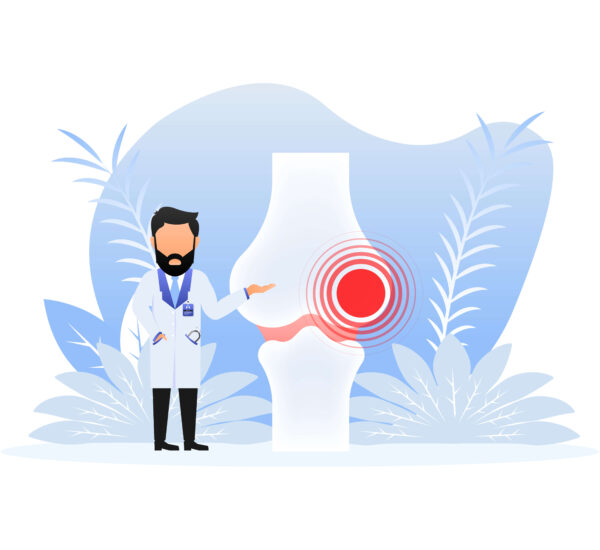Living with rheumatoid arthritis can be a challenge. The symptoms can be debilitating and impact your daily life. That’s why finding the right rheumatoid doctor is crucial in managing this chronic condition. In this article, we will provide an overview of rheumatoid arthritis, discuss the role of rheumatoid doctors in treatment, and guide you through the process of finding the most suitable specialist for your needs.
Understanding Rheumatoid Arthritis
Rheumatoid arthritis, often referred to as RA, is an autoimmune disease that primarily affects the joints. Unlike osteoarthritis, which is caused by wear and tear, RA occurs when the immune system mistakenly attacks the lining of the joints, leading to inflammation and damage. This chronic condition can result in pain, stiffness, swelling, and decreased mobility.
Living with rheumatoid arthritis can be challenging, as it impacts not only the joints but also other parts of the body. For instance, some individuals with RA may experience skin rashes, eye inflammation, lung complications, or heart problems. These systemic complications highlight the importance of seeking specialized care from a rheumatoid doctor who can address the diverse manifestations of the disease.
When it comes to managing rheumatoid arthritis, rheumatoid doctors, also known as rheumatologists, play a crucial role. They are medical specialists who focus on diagnosing and managing rheumatoid arthritis. With their expertise, they can develop personalized treatment plans to relieve symptoms, slow down the progression of the disease, and minimize long-term damage.
The Role of Rheumatoid Doctors in Treatment

Rheumatoid doctors are well-versed in the latest advancements in rheumatology and have a deep understanding of the complexities of RA. They have the expertise to interpret diagnostic tests, such as blood work and imaging studies, to make an accurate diagnosis. By identifying the specific characteristics of your condition, they can tailor treatment strategies to suit your needs.
One of the primary goals of rheumatoid doctors is to reduce inflammation, which is a hallmark of rheumatoid arthritis. They may prescribe disease-modifying antirheumatic drugs (DMARDs) to suppress the immune system and prevent further joint damage. Additionally, they may recommend nonsteroidal anti-inflammatory drugs (NSAIDs) or corticosteroids to alleviate pain and swelling.
However, rheumatoid doctors understand that medication alone is not always sufficient. They may also incorporate other treatment modalities into your care plan. For instance, physical therapy can help improve joint function and mobility, while occupational therapy can assist with adapting daily activities to accommodate the limitations imposed by RA. In some cases, assistive devices, such as braces or splints, may be recommended to provide additional support.
The Importance of Specialized Care for Rheumatoid Arthritis

When it comes to rheumatoid arthritis, specialized care is crucial. Rheumatoid doctors have extensive experience in managing this condition and are up-to-date with the most effective treatment options. They understand that every patient is unique and will tailor their approach based on your specific needs.
In addition to prescribing medications to reduce inflammation, rheumatoid doctors may recommend physical therapy, occupational therapy, or assistive devices to optimize your quality of life. They can also provide guidance on lifestyle modifications, such as exercise, diet, and stress management techniques, that can complement medical treatment.
Furthermore, rheumatoid doctors are well-connected within the medical community and can refer you to other specialists if necessary. For example, if you develop eye complications related to your rheumatoid arthritis, they can coordinate with an ophthalmologist to ensure comprehensive care.
On the other hand, addressing the need for early stage thumb arthritis test can occur with the help of this heath expert. This type of medical treatment can help patients with arthritis, which rheumatoid doctor can play a vital role in. By seeking their expertise, individuals with rheumatoid arthritis can optimize their quality of life and minimize long-term damage.
Starting Your Search for a Rheumatoid Doctor

If you suspect you have rheumatoid arthritis or have already been diagnosed and are seeking a rheumatoid doctor, there are several avenues you can explore to find the right specialist for you.
Rheumatoid arthritis is a chronic autoimmune disease that primarily affects the joints, causing pain, inflammation, and stiffness. It is important to find a rheumatoid doctor who specializes in managing this condition and can provide the necessary care and treatment.
Utilizing Medical Referrals
One of the most reliable ways to find a rheumatoid doctor is by asking for a referral from your primary care physician or another healthcare professional. These medical professionals are well-connected within the healthcare community and can recommend a rheumatoid specialist who has a good reputation.
When seeking a referral, it is essential to communicate your specific needs and preferences. Rheumatoid arthritis is a complex condition, and different doctors may have varying approaches to treatment. By providing your primary care physician with a clear understanding of your symptoms, medical history, and treatment goals, they can refer you to a rheumatoid doctor who aligns with your needs.
Additionally, you can reach out to friends, family members, or support groups who have experience with rheumatoid arthritis. They may be able to provide valuable insights and recommendations based on their own experiences. Connecting with others who have firsthand knowledge of the condition can be a source of comfort and guidance as you navigate your search for a rheumatoid doctor.
Online Resources for Finding Specialists
Another valuable resource for finding a rheumatoid doctor is the internet. There are numerous online directories and review sites that can help you identify rheumatoid specialists in your area. These platforms often provide ratings, reviews, and detailed profiles of doctors, allowing you to make an informed decision.
When using online resources, it is important to approach them with caution. While reviews and ratings can be helpful, they should not be the sole determining factor in your decision-making process. Personal preferences and experiences can vary significantly, so it is essential to meet with the doctor and assess their suitability for yourself.
Before scheduling an appointment, take the time to research the doctor’s credentials, experience, and areas of expertise. Look for any additional certifications or specialized training in rheumatology. You may also want to consider factors such as the doctor’s location, office hours, and availability for appointments.
Once you have identified potential rheumatoid doctors, it is advisable to schedule consultations with them. During these meetings, you can discuss your symptoms, ask questions about their approach to treatment, and evaluate their communication style and bedside manner. Building a strong doctor-patient relationship is crucial for managing rheumatoid arthritis effectively.
Remember, finding the right rheumatoid doctor may take time and patience. It is essential to prioritize your health and well-being by seeking a specialist who understands your unique needs and can provide the comprehensive care you deserve.
Evaluating Potential Rheumatoid Doctors
When it comes to managing rheumatoid arthritis, finding the right doctor is crucial. Once you have identified a list of potential rheumatoid doctors, it is essential to evaluate them to ensure they meet your expectations and needs. Let’s explore some key factors to consider during the evaluation process.
Checking Credentials and Experience
Start by researching each doctor’s credentials and experience. Verify that they are board-certified in rheumatology and have undergone specialized training in the field. This certification ensures that they have met the rigorous standards set by the medical board and have the necessary expertise to diagnose and treat rheumatoid arthritis.
Consider their years of experience as well. While it’s not to say that newly certified doctors are not competent, having a doctor with several years of experience can provide you with a sense of reassurance. Additionally, look into any additional certifications or areas of expertise they may have. This could include sub-specialties within rheumatology, such as pediatric rheumatology or rheumatoid arthritis research.
It is also advisable to check if the rheumatoid doctor has published research articles or participated in clinical trials related to rheumatoid arthritis. This demonstrates their commitment to staying updated with the latest advancements and their active involvement in the field. Doctors who engage in research and clinical trials often have a deeper understanding of the condition and may offer innovative treatment options.
Assessing Communication Style and Patient Care Philosophy
Effective communication between you and your rheumatoid doctor is essential for a successful doctor-patient relationship. During your initial consultation, pay attention to how the doctor communicates with you. Do they listen attentively to your concerns? Do they take the time to understand your unique needs and preferences?
Furthermore, consider their patient care philosophy. Do they prioritize shared decision-making and involve you in the treatment planning process? A doctor who values your input and actively involves you in your own care can make a significant difference in your treatment journey. They should encourage open dialogue and address your questions and concerns with empathy and respect.
Remember, managing rheumatoid arthritis is a long-term commitment, and having a positive doctor-patient relationship is vital. You want a doctor who not only possesses the necessary medical expertise but also understands your individual circumstances and supports you throughout your treatment.
Making Your Final Decision

After evaluating potential rheumatoid doctors, you will need to make a final decision that aligns with your needs, preferences, and logistical considerations.
Considering Logistics and Practicalities
Take into account the location and accessibility of each rheumatoid doctor’s clinic. Consider factors such as travel time, ease of parking, and public transportation options. Additionally, check their office hours to ensure they are compatible with your schedule.
Insurance coverage is another practical factor to consider. Contact your insurance provider to determine which rheumatoid doctors are in-network and covered by your plan. This can help you make an informed decision while managing your healthcare costs.
Trusting Your Instincts
Finally, trust your instincts. Reflect on your interactions with the rheumatoid doctors you met and consider how comfortable you felt. Remember that it is important to have trust and confidence in your doctor, as they will be managing your long-term care.
If you have any lingering doubts or reservations about a particular rheumatoid doctor, it may be wise to continue your search until you find someone who feels like the right fit for you.
Preparing for Your First Appointment
Once you have chosen a rheumatoid doctor, it is important to prepare for your first appointment to make the most of your time together.
What to Bring to Your First Visit
Compile a list of your symptoms, including when they started, their severity, and any factors that worsen or alleviate them. Bring any relevant medical records, such as previous test results or imaging studies.
It is also helpful to bring a list of medications you are currently taking, including any over-the-counter supplements or alternative therapies. This comprehensive information will assist your rheumatoid doctor in making an accurate diagnosis and developing an appropriate treatment plan.
Questions to Ask Your New Rheumatoid Doctor
Prepare a list of questions to ask your rheumatoid doctor during your first appointment. Consider asking about their treatment approach, potential side effects of medications, and lifestyle modifications to manage your symptoms.
Don’t be afraid to ask for clarification or additional information if something is unclear. Your rheumatoid doctor is there to guide and support you in managing your condition effectively.
Final Takeaway
Finding the right rheumatoid doctor may take time and effort, but it is a crucial step in managing your rheumatoid arthritis effectively. By understanding the role of rheumatoid doctors, and utilizing online resources, it can help you find the right specialist for you.
Choose the right specialist to meet your rheumatoid arthritis needs.
Rheumatoid Arthritis Knowledge Quiz
Test your understanding of RA and when to see a rheumatologist



